14 Bottled Water Facts and Statistics in the UK: 2025 Update
-
Pete Ortiz
- Last updated:
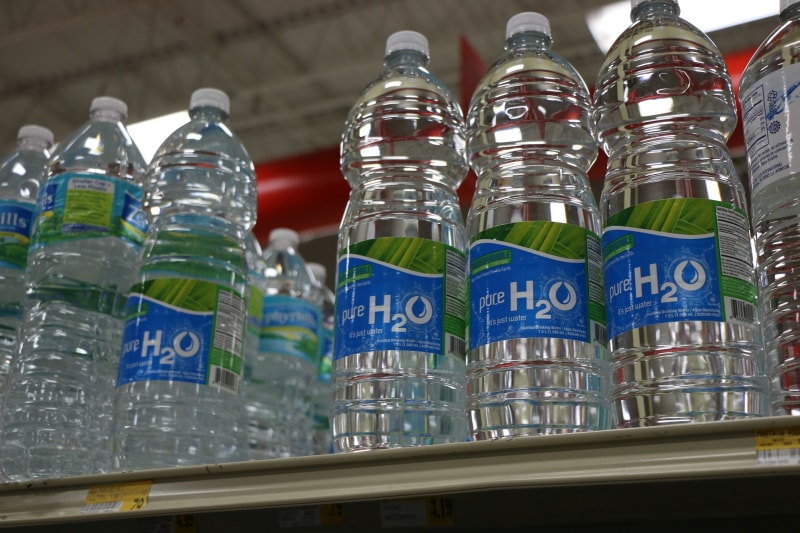
Note: This article’s statistics come from third-party sources and do not represent the opinions of this website.
Bottled water is one of the most popular non-alcoholic beverages in the world and is especially popular in the UK where billions of litres of the drink are sold every year. It can be still or sparkling, and there is an increasing range of flavoured bottled waters being introduced to the market. The water itself can originate from several countries around the world, with the most popular brands being sourced from France and Scotland.
Unfortunately, any discussion of bottled water has to look at the environmental impact of its packaging. Plastic bottles, although recyclable, are one of the most commonly found items on beaches around the world and they can also end up in landfill, where they take up to 450 years to fully degrade.
Below are 14 bottled water facts and statistics relating to the UK and its bottled water market.
The 14 Bottled Water Facts and Statistics in the UK
- The UK bottled water market is worth £1.6 billion.
- Volvic is the most popular bottled water brand, followed by Evian and Highland Spring.
- The UK consumes over 2.5 billion litres of bottled water a year.
- Londoners buy more than three plastic water bottles per week.
- The average price of a bottle of water is 83p.
- The UK is ranked as having the 13th best quality tap water in the world.
- The UK throws away 7.7 billion plastic water bottles every year.
- It takes 450 years for a plastic bottle to decompose.
- Approximately three-quarters of plastic bottles are not recycled.
- London has invested £5 million to install drinking fountains across the capital and reduce plastic waste.
- Approximately 1 in 5 never drink bottled water.
- 35% prefer the taste of bottled water to tap water.
- Only 8% of bottled water drinkers have bought canned water.
- The primary reason people drink bottled water is that they believe it is healthier than tap water.
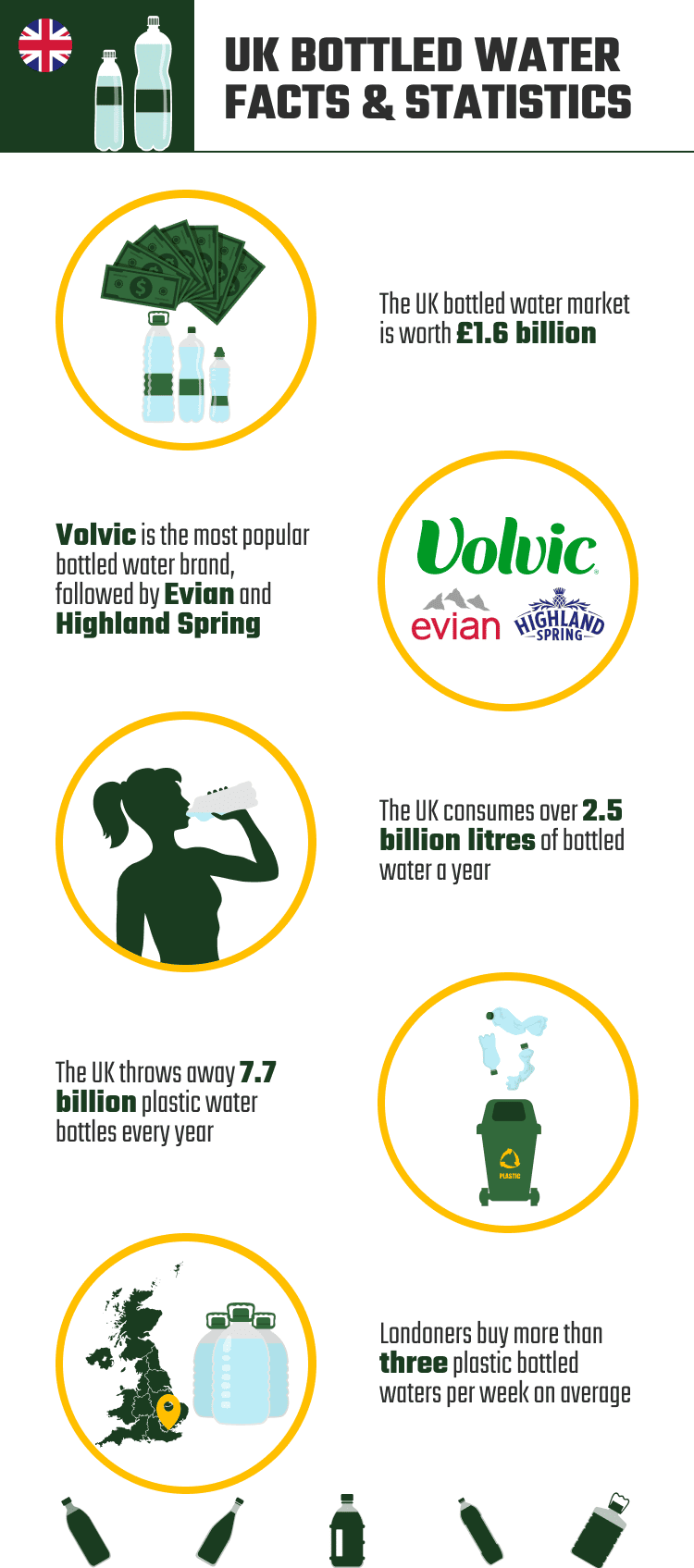
The Bottled Water Market
1. The UK bottled water market is worth £1.6 billion.
(Statista 1)
The bottled water market in the UK is worth around £1.6 billion. The market consists of companies responsible for sourcing, transporting, and bottling still and carbonated water, as well as transporting the products. The bottled water industry includes both plastic and water bottles, as well as canned water. However, the vast majority of water sold in the UK is sold in plastic bottles.
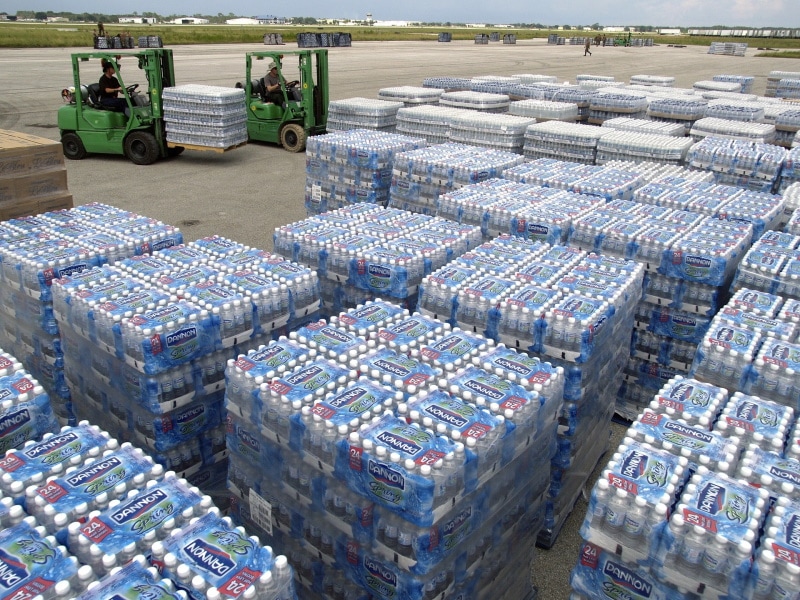
2. Volvic is the most popular bottled water brand, followed by Evian and Highland Spring.
(Statista 2)
Volvic is the most popular bottled water brand in the UK, primarily selling still water. The brand is owned by Danone, which also owns Evian, the second most popular bottled water brand in the country.
Danone also owns Aqua and Bonafont, as well as several other bottled water brands. The third most popular water brand is Highland Spring. Volvic and Evian waters are sourced from France while Highland Spring water comes from Scotland.
3. The UK consumes over 2.5 billion litres of bottled water a year.
(Statista 3)
Approximately 2.5 billion litres of bottled water is consumed in the UK every year. With a total population of 67 million people, this equates to nearly 40 litres of water consumed per person, on average, every year.
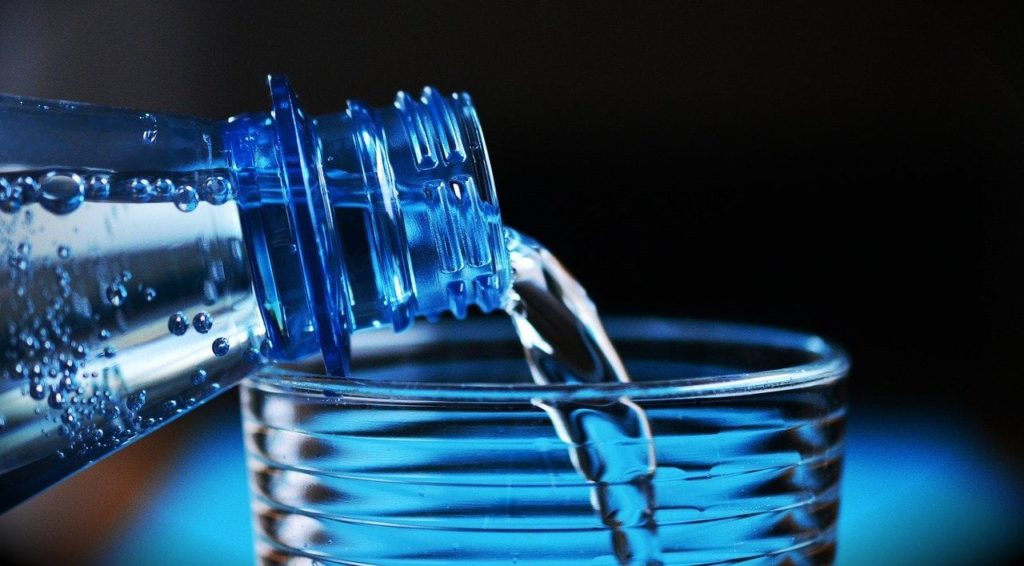
4. Londoners buy more than three plastic water bottles per week.
(London.gov.uk)
London is one of the highest consuming areas when it comes to bottled water. The average London adult buys more than three plastic bottles of water every week. The city has invested in increasing the number of free, public water fountains, while also establishing the Refill program that enables individuals to freely fill up their water bottles in stores, restaurants, and other locations that are participating in the scheme.
5. The average price of a bottle of water is 83 pence.
(Global Produce Prices), (Discover Water)
The price of bottled water ranges from 45p for a 2-litre bottle of supermarket own-brand water to 90p for a typical 2-litre bottle of premium-brand water. The average cost works out to be 83 pence for a 2-litre bottle.
Although prices also vary for tap water, according to whether a consumer is metered or pays a flat rate and the area where they live, bottled water costs more than 250 times as much as tap water.
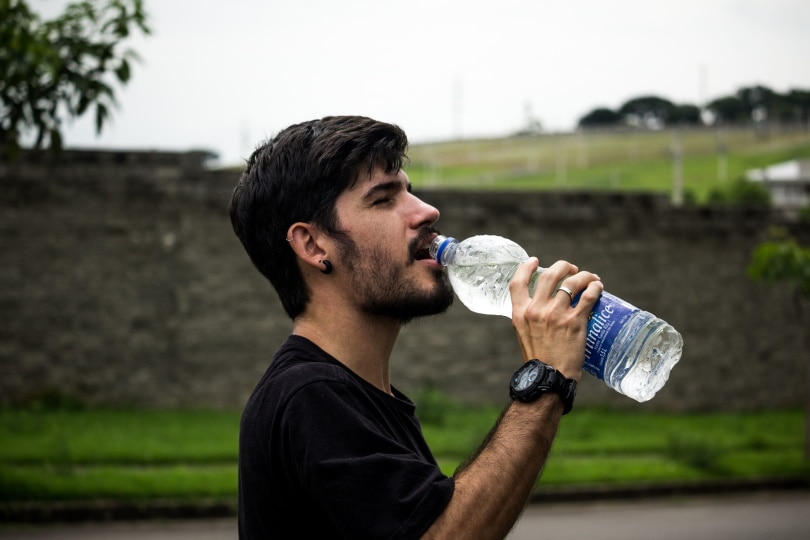
Environmental Considerations
6. The UK is ranked as having the 13th best quality tap water in the world.
(Hidropolitik Akademi)
The UK has one of the highest rates of bottled water consumption per capita anywhere in the world, despite having tap water that is considered very safe to drink. In fact, according to statistics and studies, the UK’s water is the 13th best of any country in the world.
7. The UK throws away 7.7 billion plastic water bottles every year.
(Water UK)
The biggest concern with bottled water is that the majority of the water is sold in plastic bottles, which are bad for the environment. The bottles are usually made from either PET or HDPE plastic, both of which can be recycled, but many still end up in landfill or, worse still, in the sea and on beaches around the world. In total, 7.7 billion plastic water bottles are thrown away in the UK every year.
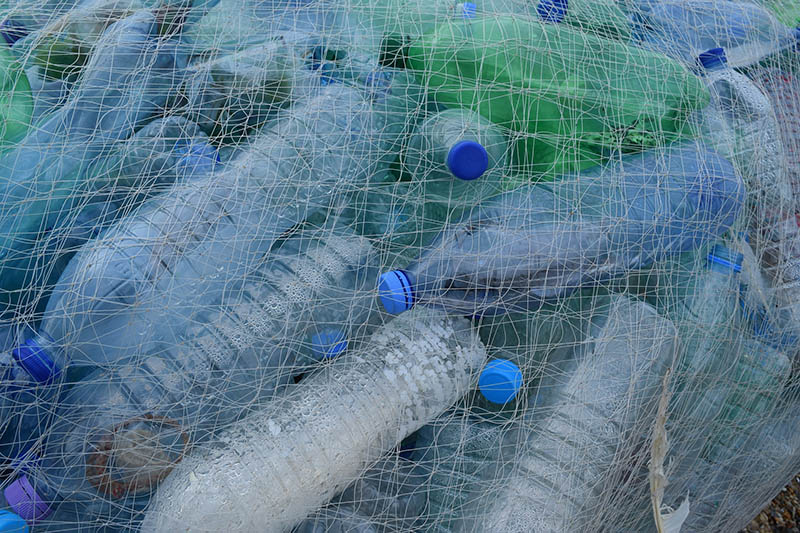
8. It takes 450 years for a plastic bottle to decompose.
(WWF)
Plastic water bottles are some of the slowest degrading items that are thrown away. While it takes approximately 20 years for a plastic bag to decompose, it can take as long as 450 years for a plastic bottle to completely degrade.
9. Approximately three-quarters of plastic bottles are not recycled.
(WWF)
Although plastic bottles are recyclable, the vast majority do not end up recycled. According to the World Wildlife Fund, around three-quarters of plastic bottles do not get recycled, so they end up in landfills and are discarded in other ways.
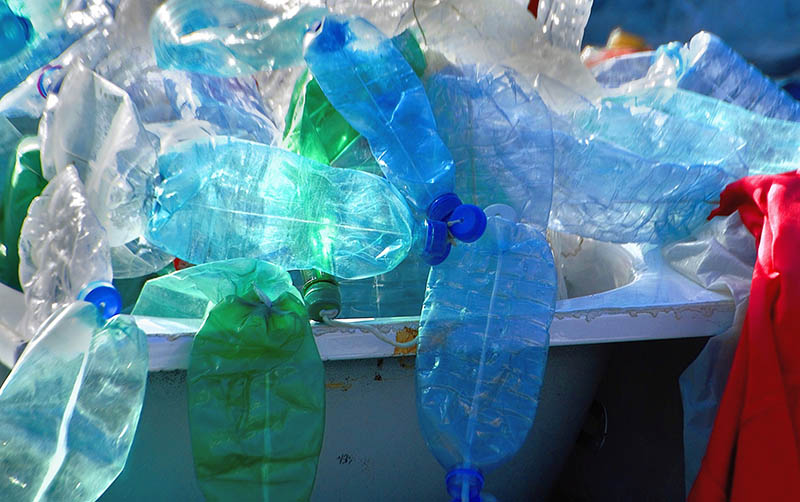
10. London has invested £5 million to install drinking fountains across the capital and reduce plastic waste.
(London.gov.uk)
Some local councils and other groups have taken steps to try and reduce the number of plastic bottles that are used every year. The Greater London Authority has invested £5 million to install additional public water fountains that can be used to fill reusable bottles, and a Refill scheme has been set up.
Shops and other premises that take part in the Refill scheme allow people to walk in and have their reusable bottles filled with no charge or other commitment.
Consumer Opinions
11. Approximately 1 in 5 never drink bottled water.
(YouGov)
Only 22% of people say that they never drink bottled water. Approximately 35% said that they drink bottled water about once a month and 18% said that they drink bottled water every day. Those who drink bottled water every day are spread quite evenly across age groups. For those who say they never drink bottled water, less than 20% of 25 to 39-year-olds agreed compared to 42% of people aged 60 or over.
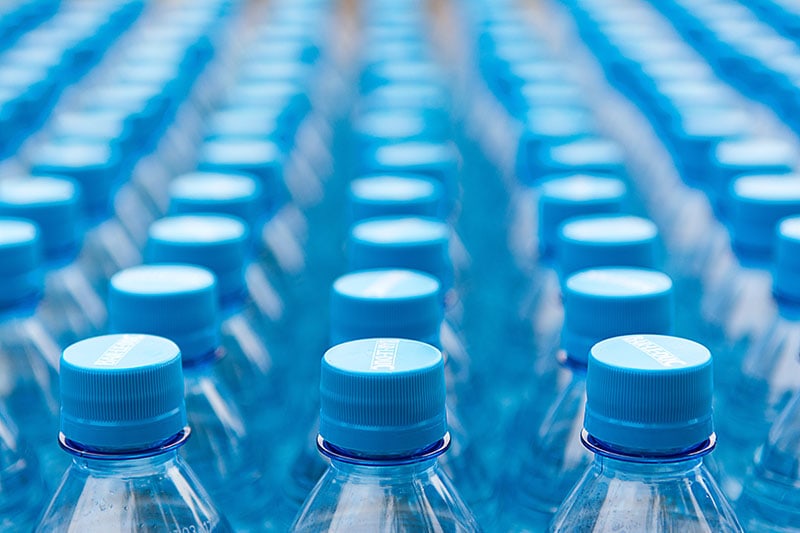
12. 35% prefer the taste of bottled water to tap water.
(Statista 4)
The UK’s drinking water is considered safe for consumption, cooking, and bathing. In fact, the UK has one of the safest tap water supplies in the world. One of the main motivations behind people choosing to drink bottled water is that they say they prefer the taste. More than a third, or 35%, of people questioned said that they prefer bottled water to tap water.
13. Only 8% of bottled water drinkers have bought canned water.
(New Food Magazine)
Canned water is a relatively new introduction to the market. It can be packaged in fully recyclable aluminium cans and has a much lower impact on the environment, but cans are smaller than the large 2-litre bottles and they tend to cost more. Canned water is also not as readily available as bottled water. For these reasons, only 8% of mineral water drinkers have bought a can of water.

14. The primary reason people drink bottled water is that they believe it is healthier than tap water.
(Tapp Water)
Common complaints about tap water include poor taste, a concern over contaminants in the water, and limescale. Looking at the individual nations of the UK, the main motivation for people choosing bottled water over tap water is, in all nations, that they think bottled water is healthier than tap water.
 Frequently Asked Questions about Bottled Water in the UK
Frequently Asked Questions about Bottled Water in the UK
How Much Bottled Water Is Sold Each Year?
Globally, approximately 500 billion litres of bottled water are sold every year, which is equivalent to between 50 and 60 litres per person, per year. In the UK, we consume approximately 2.5 billion litres per annum, which is just under 40 litres per person every year. (Statista 5)
Who Drinks the Most Bottled Water?
With a population of over 1.4 billion people, China also consumes the most bottled water of any country in the world, drinking just over 10 billion gallons a year. Unfortunately, the country does suffer from the sale of “fake water” which is essentially just bottled tap water, and although some parts of the country have safe tap water, this isn’t true in all of the nation.
The USA, with a population of around one-fifth of China’s, consumes almost the same amount of bottled water. (World Atlas)
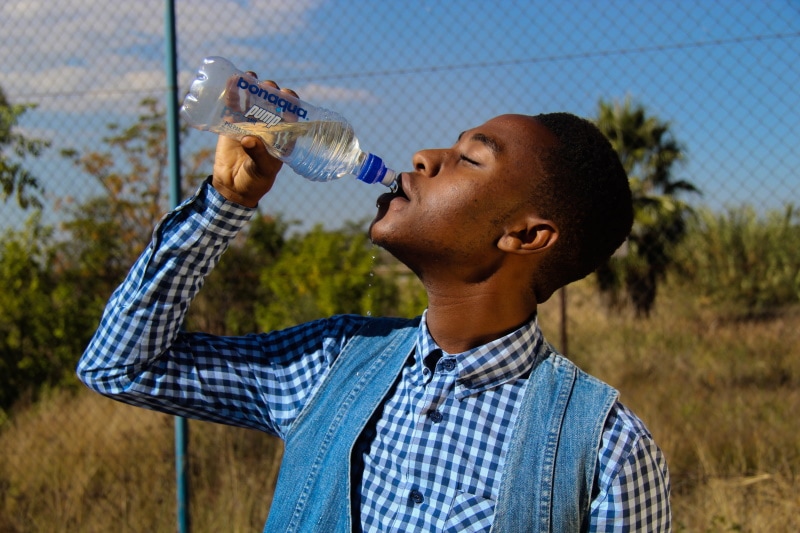
Is It Safe to Drink Water from Plastic Bottles?
Although much depends on the quality of the water inside, drinking from BPA-free plastic bottles is considered safe. If they contain any contaminants, they are only present in very small concentrations, which means that the water should be perfectly safe.
It has also been found that freezing and warming the bottles of water do not affect contaminant levels.
However, bacteria and fungi can grow in water that is left for too long, so if an opened bottle has been left sitting for too long, it is best to discard the water. (Cancer Council)
What Company Owns Most of the Bottled Water Industry?
The single largest bottled-water company in the world is Danone. Danone has annual sales equivalent to £23 billion a year thanks to the range of water brands they own. The French company owns Volvic, Evian, Aqua, and Bonafont, among others. (Zippia)
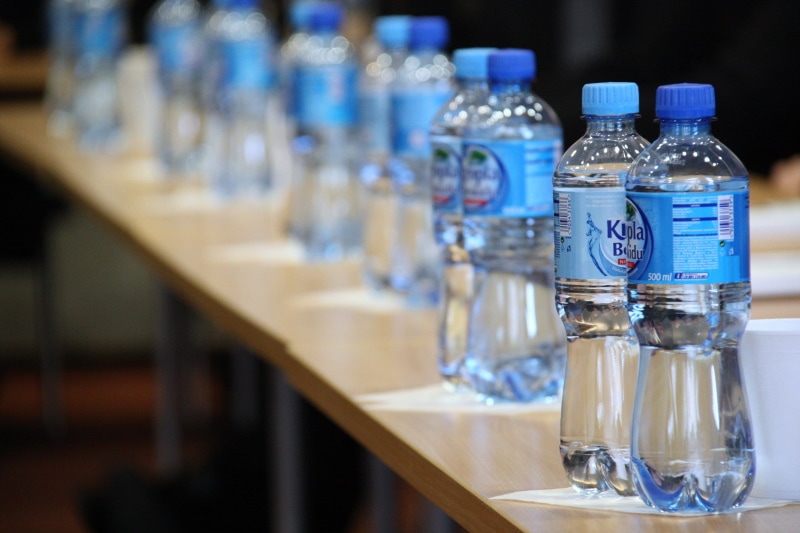
Conclusion
Despite having some of the cleanest and safest tap water in the world, the UK also has one of the highest consumption rates per capita for bottled water, consuming 2.5 billion litres of the stuff every year. Unfortunately, the majority of bottled water is sold in plastic bottles, and the majority of these bottles are not recycled, despite most of them being fully recyclable. The most successful water brand in the UK is Volvic and one of several water brands owned by Danone, the largest bottled water company in the world.
Featured Image Credit: Denys Vitali, Pixabay
Contents


 Frequently Asked Questions about Bottled Water in the UK
Frequently Asked Questions about Bottled Water in the UK